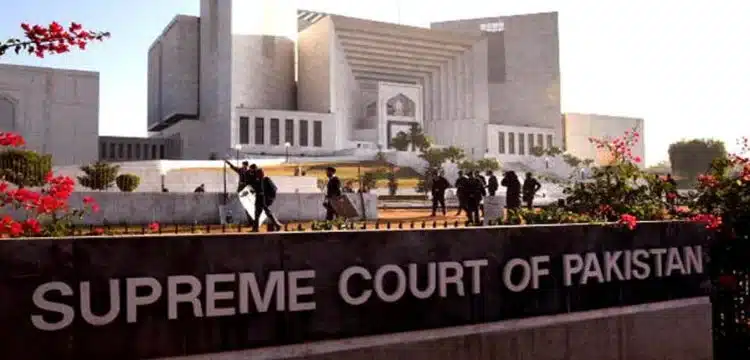[vc_row][vc_column][vc_column_text dp_text_size=”size-4″]The Supreme Court of Pakistan took proactive action on Monday in response to a letter from senior judges of the Islamabad High Court, initiating suo-motu proceedings and assembling a larger bench to address the issue. Chief Justice Qazi Faez Isa will lead the seven-member bench, comprising Justice Mansoor Ali Shah, Justice Jamal Mandokhail, Justice Yahya Afridi, Justice Musarrat Hilali, Justice Athar Minallah, and Justice Naeem Afghan.
This move by the apex court follows the government’s establishment of a judicial commission, headed by retired Justice Tassaduq Hussain Jilani, to investigate the allegations raised by the IHC judges. The seven-member bench will convene at 11:30 am on Wednesday to deliberate on the matter.
Read more: PM Shehbaz To Meet CJP Isa On March 28 Over IHC Judges‘ Letter
The decision comes after the government approved a judicial inquiry into the concerns expressed by six judges of the Islamabad High Court, with former Chief Justice Tasadduq Hussain Jilani appointed to lead the inquiry commission. The cabinet also endorsed the terms of reference (TORs) for the inquiry commission, granting it a 60-day timeframe to compile its findings.
Last week, the Chief Justice of Pakistan convened a full court meeting to address the letter submitted by the IHC judges, highlighting alleged interference by intelligence agencies in judicial affairs. In their letter, Justices Mohsin Akhtar Kayani, Tariq Mahmood Jahangiri, Babar Sattar, Sardar Ejaz Ishaq Khan, Arbab Muhammad Tahir, and Saman Raffat Imtiaz underscored the importance of upholding judicial conventions to safeguard the independence of the judiciary in the nation.
The letter cited instances of interference and intimidation by intelligence personnel, including the abduction of a judge’s relative and illegal surveillance of judges’ residences. The judges emphasized the imperative to shield judicial independence and ensure that the judiciary remains uninfluenced by external agencies. Additionally, they recounted incidents where district court judges faced intimidation, with at least one Additional District and Sessions Judge being threatened and subjected to intimidation tactics, such as the hurling of explosives at his residence.[/vc_column_text][/vc_column][/vc_row]











